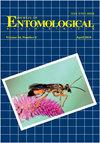New Hosts, Distribution, and Color Trap Preferences of the Invasive Thrips Scirtothrips dorsalis (Thysanoptera: Thripidae) in Mexico1
IF 0.7
4区 农林科学
Q4 ENTOMOLOGY
引用次数: 0
Abstract
Scirtothrips dorsalis Hood (Thysanoptera: Thripidae) is an insect of Asian origin and is currently distributed in several countries around the world. It has highly polyphagous habits and has been reported as a primary pest of different fruit, horticultural, and ornamental crops. This species was reported in Mexico in 2020, however, due to its invasive nature and its rapid adaptation to new ecosystems, it is probably present in other regions of the country. The lack of information on this pest has resulted in misidentifications and misdiagnosis at the field level by phytosanitary technicians. In the present work, we found that S. dorsalis is distributed in the states of Veracruz, Sinaloa, Jalisco, and Michoacán in Mexico occupying sites with different climates (warm and temperate) and elevations from 6 to 1,721 m above sea level. Plant reproductive hosts were blackberry (Rubus sp.), blueberry (Vaccinium sp.), Persian lime (Citrus latifolia Tanaka), mango (Mangifera indica L.), and pear (Pyrus communis L.). Through an evaluation of the response of adults toward chromatic traps, we found that this species greatly prefers yellow (×5.40) compared with blue color. More studies are needed on detection and control measures in order to reduce the distribution and economic impact caused by this insect pest in Mexico.墨西哥入侵蓟马背蓟马的新寄主、分布和色诱偏好[j]
Scirtothrips dorsalis Hood(蓟翅目:蓟科)是一种原产于亚洲的昆虫,目前分布在世界多个国家。它有高度多食的习性,据报道是不同水果、园艺和观赏作物的主要害虫。该物种于2020年在墨西哥被报道,然而,由于其入侵性和对新生态系统的快速适应,它可能存在于该国的其他地区。由于缺乏关于这种有害生物的信息,导致植物检疫技术人员在实地一级的错误识别和误诊。在本研究中,我们发现dorsalis分布在墨西哥的韦拉克鲁斯州、锡那罗亚州、哈利斯科州和Michoacán,占据了不同气候(温暖和温带)和海拔6 ~ 1721 m的地点。植物生殖寄主为黑莓(Rubus sp)、蓝莓(Vaccinium sp)、波斯酸橙(Citrus latifolia Tanaka)、芒果(Mangifera indica L.)和梨(Pyrus communis L.)。通过对成虫对彩色诱捕器的反应评价,我们发现与蓝色诱捕器相比,该物种更喜欢黄色(×5.40)。为了减少这种害虫在墨西哥的分布和造成的经济影响,需要对检测和控制措施进行更多的研究。
本文章由计算机程序翻译,如有差异,请以英文原文为准。
求助全文
约1分钟内获得全文
求助全文
来源期刊
CiteScore
1.20
自引率
11.10%
发文量
40
审稿时长
>12 weeks
期刊介绍:
The Journal of Entomological Science (ISSN 0749-8004) is a peer-reviewed, scholarly journal that is published quarterly (January, April, July, and October) under the auspices of the Georgia Entomological Society in concert with Allen Press (Lawrence, Kansas). Manuscripts deemed acceptable for publication in the Journal report original research with insects and related arthropods or literature reviews offering foundations to innovative directions in entomological research

 求助内容:
求助内容: 应助结果提醒方式:
应助结果提醒方式:


